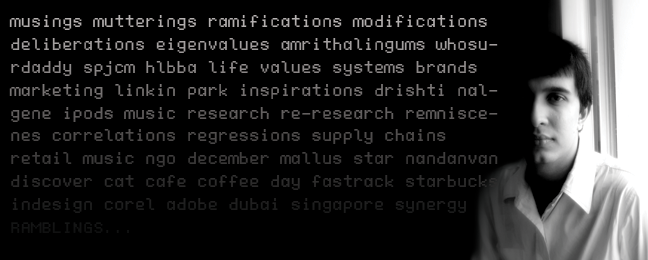Everybody, or lets say almost everybody is loving the retail boom in India. I agree that its high time the retailers started giving a shopping experience that the mom and pop stores fail to provide.
And quite obviously one of the major attractions of the retail boom is the cost effectiveness being passed on to the customer. This holds true especially for daily household items and perishable goods like vegetables and regular grocery.
When it comes to the case of vegetables, Reliance Fresh is quite popular. And the fact that Reliance Fresh is more popular as compared to the other mandi fellows isn’t surprising. With air-conditioned environments and the likes it does become a favored place for people to shop for vegetables than the mandi with all its flies and cow-dung infested market space.
But someone tell me, is the core business proposition of Reliance Fresh – to sell fruits and vegetables (which however has been altered in recent times thanks to some unfortunate circumstances) a really profitable and more importantly a sustainable one? The basic problem with the service delivery is not the product, but the costs attached to it, and unlike in developed countries where these costs do not form a larger part of the expense-pie, it sadly does as far as India goes.
I mean, lets take an example of a Reliance Fresh store in Ahmedabad. An average Reliance store would have around 8 split air conditioners with 1.5 ton capacity. The commercial electricity rate for Ahmedabad is 4.85 rupees per unit. And assuming a typical reliance outlet operates for 12 hours a day, the total energy consumption of just 8 air-conditioners for 12 hours a day for a month comes to 3240 units = Rs.15,714 just for the air conditioning alone. The racks with cold storage which keeps the vegetables cool consumes almost twice or thrice as much as the power consumed by the A/Cs to keep the vegetables fresh, and thus twice or thrice as much increase in expenses. And we’ve still not taken the illumination and labour charges into account and not even the rent for the place which, by itself would also be equally high.
Now, spending almost a half a lakh on just illumination and cooling, plus an equitable sum on the rent for the place is quite a lot for just selling vegetables of which the largest selling commodities are tomatoes and potatoes which virtually have negligible margins. I do understand that there are some exotic SKUs like broccoli and things like that which give higher margins, but clearly it’s the potatoes and the tomatoes and other similar vegetables for which the customer comes to Reliance Fresh in the first place.
Lower margins and freaky expenses… it just doesn’t add up at least to me! And I still haven’t taken into account a lot of things… the supply chain expenses, the management fees, the cold storage expenses and most importantly the markdowns that happen everyday since vegetables are a perishable commodity.
I just don’t see where the money is coming… its just going out! If Reliance really wants to be in the market of vegetables for long, the current system at least doesn’t approve of it… can’t say about the future.
Your take…




